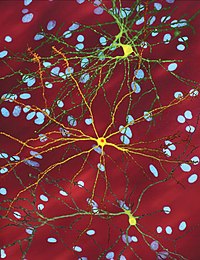
Towards the first 90: impact of the national HIV self‐test program on case finding and factors associated with linkage to confirmatory diagnosis in Taiwan
Sign Up to like & getrecommendations! Published in 2022 at "Journal of the International AIDS Society"
DOI: 10.1002/jia2.25897
Abstract: Being aware of one's HIV‐positive status can help reduce unprotected sex and promote early treatment seeking. Therefore, HIV self‐test (HIVST) programs may help control the HIV epidemic by case finding. The aims of this study… read more here.
Keywords: case finding; confirmatory diagnosis; hiv self; self test ... See more keywords

Case‐finding tools for the diagnosis of OAB in women: A narrative review
Sign Up to like & getrecommendations! Published in 2019 at "Neurourology and Urodynamics"
DOI: 10.1002/nau.24171
Abstract: Overactive bladder (OAB) remains underdiagnosed with many patients never seeking medical help. Methods to aid early identification and treatment of OAB will be hugely beneficial, and to this end several case‐finding tools have been developed.… read more here.
Keywords: case finding; tools diagnosis; oab women; finding tools ... See more keywords

Natural language processing of radiology reports for the identification of patients with fracture
Sign Up to like & getrecommendations! Published in 2021 at "Archives of Osteoporosis"
DOI: 10.1007/s11657-020-00859-5
Abstract: Summary Text-search software can be used to identify people at risk of re-fracture. The software studied identified a threefold higher number of people with fractures compared with conventional case finding. Automated software could assist fracture… read more here.
Keywords: fracture; fracture liaison; radiology; case finding ... See more keywords

Performance of a Random Glucose Case-Finding Strategy to Detect Undiagnosed Diabetes.
Sign Up to like & getrecommendations! Published in 2017 at "American journal of preventive medicine"
DOI: 10.1016/j.amepre.2017.01.023
Abstract: INTRODUCTION Random glucose read more here.
Keywords: undiagnosed diabetes; random glucose; random; performance ... See more keywords

Intensified case finding for screening tuberculosis among antenatal women in Delhi, India; A facility-based prospective observational study
Sign Up to like & getrecommendations! Published in 2021 at "Clinical Epidemiology and Global Health"
DOI: 10.1016/j.cegh.2021.100816
Abstract: Abstract Background Tuberculosis (TB) during pregnancy accentuates the risk of adverse maternal and fetal outcomes, including perinatal deaths, preterm births, and low birth weight babies. Screening for active TB during pregnancy by healthcare providers can… read more here.
Keywords: delhi india; intensified case; tuberculosis; prospective observational ... See more keywords

Care pathways for glaucoma detection and monitoring in the UK
Sign Up to like & getrecommendations! Published in 2019 at "Eye"
DOI: 10.1038/s41433-019-0667-9
Abstract: Glaucoma presents considerable challenges in providing clinically and cost-effective care pathways. While UK population screening is not seen as justifiable, arrangements for case finding have historically been considered relatively ineffective. Detection challenges include an undetected… read more here.
Keywords: pathways glaucoma; glaucoma detection; care pathways; case finding ... See more keywords

Specialist respiratory outreach: a case-finding initiative for identifying undiagnosed COPD in primary care
Sign Up to like & getrecommendations! Published in 2021 at "NPJ Primary Care Respiratory Medicine"
DOI: 10.1038/s41533-021-00219-x
Abstract: COPD remains largely undiagnosed or is diagnosed late in the course of disease. We report findings of a specialist outreach programme to identify undiagnosed COPD in primary care. An electronic case-finding algorithm identified 1602 at-risk… read more here.
Keywords: copd; primary care; undiagnosed copd; case finding ... See more keywords

Point-of-care SARS-CoV-2 serological assays for enhanced case finding in a UK inpatient population
Sign Up to like & getrecommendations! Published in 2021 at "Scientific Reports"
DOI: 10.1038/s41598-021-85247-w
Abstract: Severe Acute Respiratory Syndrome coronavirus 2 (SARS-CoV-2) has become a global pandemic. Case identification is currently made by real-time polymerase chain reaction (PCR) during the acute phase and largely restricted to healthcare laboratories. Serological assays… read more here.
Keywords: point care; case; serological assays; case finding ... See more keywords

Noninvasive Algorithms for the Case Finding of "At-Risk" Patients with NAFLD.
Sign Up to like & getrecommendations! Published in 2022 at "Seminars in liver disease"
DOI: 10.1055/s-0042-1751081
Abstract: Despite the high prevalence of non-alcoholic fatty liver disease (NAFLD) in primary care (25%), only a small minority (< 5%) of NAFLD patients will develop advanced liver fibrosis. The challenge is to identify these patients,… read more here.
Keywords: algorithms; algorithms case; noninvasive algorithms; risk ... See more keywords

Evaluating the diagnostic properties of the Whooley questionnaire as a case-finding instrument for depression among Chinese women during and after pregnancy.
Sign Up to like & getrecommendations! Published in 2022 at "Journal of psychosomatic obstetrics and gynaecology"
DOI: 10.1080/0167482x.2022.2132930
Abstract: Purpose: There is a rising prevalence in undetected perinatal depression in many countries, more effort in screening and early identification of perinatal depression is needed. While the Whooley questionnaire is the recommended case-finding strategy for… read more here.
Keywords: likelihood ratio; depression; whooley questionnaire; case finding ... See more keywords

Investigation of the association of military employment and Parkinson’s disease with a validated Parkinson’s disease case-finding strategy
Sign Up to like & getrecommendations! Published in 2022 at "Brain Injury"
DOI: 10.1080/02699052.2022.2158234
Abstract: ABSTRACT Introduction Persons with military involvement may be more likely to have Parkinson’s disease (PD) risk factors. As PD is rare, case finding remains a challenge, contributing to our limited understanding of PD risk factors.… read more here.
Keywords: case finding; employment; parkinson disease; military employment ... See more keywords